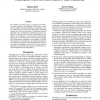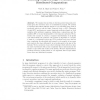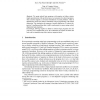318 search results - page 4 / 64 » Temporal Disjunctive Logic Programming |
111
click to vote
AAAI
2006
15 years 3 months ago
2006
We establish a declarative theory of forgetting for disjunctive logic programs. The suitability of this theory is justified by a number of desirable properties. In particular, one...
123
Voted
WDAG
2007
Springer
15 years 8 months ago
2007
Springer
Abstract. We examine the problem of detecting nested temporal predicates given the execution trace of a distributed program. We present a technique that allows efficient detection ...
132
click to vote
LANMR
2007
15 years 3 months ago
2007
Abstract We study the notion of strong equivalence between two disjunctive logic programs under the G3-stable model semantics, also called the P-stable semantics, and we show how s...
128
click to vote
ICLP
2003
Springer
15 years 7 months ago
2003
Springer
We equip ordered logic programs with negation as failure, using a simple generalization of the preferred answer set semantics for ordered programs. This extension supports a conven...
125
click to vote
KR
2004
Springer
15 years 7 months ago
2004
Springer
Disjunction is generally considered to add expressive power to logic programs under the stable model semantics, which have become a popular programming paradigm for knowledge repr...



